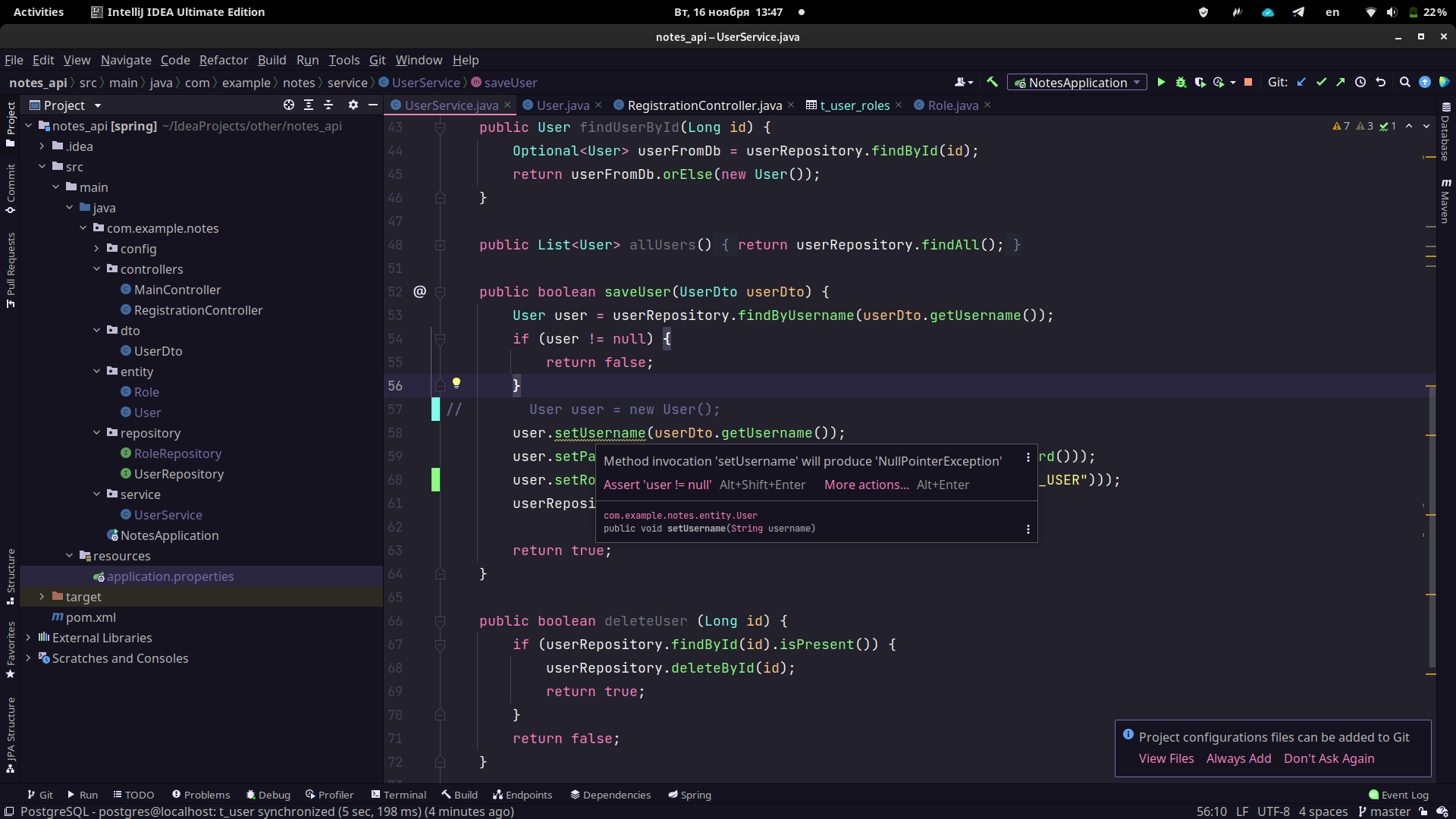Answer the question
In order to leave comments, you need to log in
Why isn't the many to many relationship assigned?
Good afternoon.
I tried to figure it out, but I didn’t succeed)
I want to make a REST API so that the login request is not sent through the form, but with JSON from the front
When I try, an error appears
user.setRoles(Collections.singleton(new Role(1L, "ROLE_USER")));
2021-11-16 07:30:02.743 ERROR 6941 --- [nio-8080-exec-2] oaccC[.[.[/].[dispatcherServlet] : Servlet.service() for servlet [dispatcherServlet] in context with path[] threw exception [Request processing failed; nested exception is java.lang.NullPointerException] with root cause
java.lang.NullPointerException: null
at com.example.notes.service.UserService.saveUser(UserService.java:57) ~[classes/:na]
user.setRoles(Collections.singleton(new Role(1L, "ROLE_USER")));import lombok.Data;
import org.springframework.security.core.GrantedAuthority;
import org.springframework.security.core.userdetails.UserDetails;
import javax.persistence.*;
import java.util.Collection;
import java.util.Set;
@Data
@Entity
@Table(name = "t_user")
public class User implements UserDetails {
@Id
@GeneratedValue(strategy = GenerationType.IDENTITY)
private Long id;
private String username;
private String password;
@ManyToMany(fetch = FetchType.EAGER)
private Set<Role> roles;
public User() {
}
@Override
public Collection<? extends GrantedAuthority> getAuthorities() {
return getRoles();
}
@Override
public boolean isAccountNonExpired() {
return true;
}
@Override
public boolean isAccountNonLocked() {
return true;
}
@Override
public boolean isCredentialsNonExpired() {
return true;
}
@Override
public boolean isEnabled() {
return true;
}
}import lombok.Data;
import org.springframework.security.core.GrantedAuthority;
import javax.persistence.*;
import java.util.Set;
@Data
@Entity
@Table(name = "t_role")
public class Role implements GrantedAuthority {
@Id
private Long id;
private String name;
@Transient
@ManyToMany(mappedBy = "roles")
private Set<User> users;
public Role(){}
public Role(Long id) {
this.id = id;
}
public Role(Long id, String name) {
this.id = id;
this.name = name;
}
@Override
public String getAuthority() {
return getName();
}
}import com.example.notes.dto.UserDto;
import com.example.notes.entity.Role;
import com.example.notes.entity.User;
import com.example.notes.repository.RoleRepository;
import com.example.notes.repository.UserRepository;
import org.springframework.beans.factory.annotation.Autowired;
import org.springframework.security.core.userdetails.UserDetails;
import org.springframework.security.core.userdetails.UserDetailsService;
import org.springframework.security.core.userdetails.UsernameNotFoundException;
import org.springframework.security.crypto.bcrypt.BCryptPasswordEncoder;
import org.springframework.stereotype.Service;
import javax.persistence.EntityManager;
import javax.persistence.PersistenceContext;
import java.util.Collections;
import java.util.List;
import java.util.Optional;
@Service
public class UserService implements UserDetailsService {
@PersistenceContext
private EntityManager entityManager;
@Autowired
private UserRepository userRepository;
@Autowired
private RoleRepository roleRepository;
@Autowired
BCryptPasswordEncoder bCryptPasswordEncoder;
@Override
public UserDetails loadUserByUsername(String username) throws UsernameNotFoundException {
User user = userRepository.findByUsername(username);
if (user == null) {
throw new UsernameNotFoundException("User not found");
}
return user;
}
public User findUserById(Long id) {
Optional<User> userFromDb = userRepository.findById(id);
return userFromDb.orElse(new User());
}
public List<User> allUsers() {
return userRepository.findAll();
}
public boolean saveUser(UserDto userDto) {
User user = userRepository.findByUsername(userDto.getUsername());
if (user != null) {
return false;
}
user.setRoles(Collections.singleton(new Role(1L, "ROLE_USER")));
user.setUsername(userDto.getUsername());
user.setPassword(bCryptPasswordEncoder.encode(userDto.getPassword()));
userRepository.save(user);
return true;
}
public boolean deleteUser (Long id) {
if (userRepository.findById(id).isPresent()) {
userRepository.deleteById(id);
return true;
}
return false;
}
public List<User> usergList (Long minId) {
return entityManager.createQuery("SELECT u FROM User u WHERE u.id > :paramId", User.class)
.setParameter("paramId", minId).getResultList();
}
}import com.example.notes.dto.UserDto;
import com.example.notes.service.UserService;
import org.springframework.beans.factory.annotation.Autowired;
import org.springframework.web.bind.annotation.PostMapping;
import org.springframework.web.bind.annotation.RequestBody;
import org.springframework.web.bind.annotation.RestController;
@RestController
public class RegistrationController {
@Autowired
private UserService userService;
@PostMapping("/registration")
public String addUser(@RequestBody UserDto userDto) {
// if (!userDto.getPassword().equals(userDto.getPasswordConfirm())) {
// return "Password not match";
// }
//
// if (!userService.saveUser(userDto)) {
// return "User already exists";
// }
userService.saveUser(userDto);
return "redirect:/";
}
}
{
"username": "username",
"password": 123123,
"passwordConfirm": 123123
}
Answer the question
In order to leave comments, you need to log in
Good afternoon.
The problem is here:
public boolean saveUser(UserDto userDto) {
User user = userRepository.findByUsername(userDto.getUsername());
if (user != null) {
return false;
}
user.setRoles(Collections.singleton(new Role(1L, "ROLE_USER")));
user.setUsername(userDto.getUsername());
user.setPassword(bCryptPasswordEncoder.encode(userDto.getPassword()));
userRepository.save(user);
return true;
}public boolean saveUser(UserDto userDto) {
User userFromDB = userRepository.findByUsername(userDto.getUsername());
if (userFromDB != null) {
return false;
}
User user = new User();
user.setUsername(userDto.getUsername());
user.setPassword(bCryptPasswordEncoder.encode(userDto.getPassword()));
user.setRoles(Collections.singleton(new Role(1L, "ROLE_USER")));
userRepository.save(user);
return true;
}
Didn't find what you were looking for?
Ask your questionAsk a Question
731 491 924 answers to any question